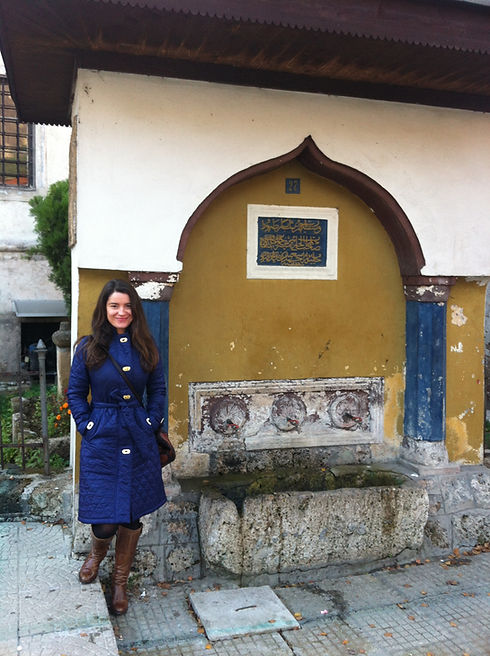My Starting Place & Approach
Advancing gender equality is critical to solving today’s global challenges. Real progress depends on unlocking the full potential of every individual—intellectually, emotionally, physically, and creatively. Doing so is essential to building lasting peace, resilient democracies, robust economies, and global security. Achieving this requires expanding rights, roles, and responsibilities for all people, regardless of their sex at birth or assigned gender.

Photo: Ethiopian Police University
Gender inequality harms everyone--individuals and families--and also weakens institutions and societies. It impedes development, undermines stability, and fuels conflict, poverty, and poor health outcomes.
Central to my approach is working with both women and men—to ensure that the principles of localization and local ownership guide every aspect of my work. I take pride in crafting creative, context-specific strategies that meaningfully engage individuals and institutions, especially on issues that may feel externally imposed or culturally distant, particularly when associated with the Global North.
The challenges associated with meaningfully advancing gender equality have also enabled me to refine my analytical and problem-solving skills and apply those to a larger context of work. This has principally included strategic support to international development implementers - whether the review of a project for a donor, an employee climate survey or institutional assessment, or a management capacity review.
My Education and Professional History
I hold a Master’s with Distinction in International Development Studies with a specialization in Women, Gender, and Development from Erasmus University, Institute of Social Studies in The Hague (December 2009).
Before pursuing graduate studies in the Netherlands, I lived and worked in Oregon, USA (2002-2008), where I served as Director of Programs for the Attorney General's Sexual Assault Task Force (SATF). In this role, I represented the Oregon Attorney General at the strategic and operational levels - at the state legislature, in the media, and on national and international platforms. I led statewide initiatives focused on professional training for law enforcement, prosecutors, forensic medical responders, and victim advocates, while also shaping public policy and advancing prevention efforts.
After completing graduate school, I briefly worked in the Registry of the International Criminal Tribunal for the Former Yugoslavia (ICTY) in The Hague (2010). I then accepted a long-term consultancy (2010/2011) with the UN Department of Peace Operations, Police Division, where I led the collaborative development of a two-week training curriculum on sexual assault response and prevention for UN Police with more than 30 member states.
During this consultancy, I was recruited by the U.S. Department of State to serve as a Gender and Human Rights Advisor for the Iraq Police Development Program. I worked in Baghdad and Erbil (2011/2012) to advance the meaningful participation of women in the police services and improve the response to gender-based violence.
In September 2012, I joined the Gender and Security Division of the Geneva Centre for Security Sector Governance (DCAF). Initially, as a Project Coordinator for the Western Balkans, I was promoted in May 2015 to Program Manager, overseeing programming across Eastern Europe and the Western Balkans. I left DCAF in September 2017 to pursue work as a freelance consultant.

Photo: Birendra Peace Operations Training Centre (BPOTC)

Working with Heather Huhtanen has been an exceptional experience. As the project leader for the "Gender and Justice" project in Bosnia and Herzegovina, Heather played a crucial role in reforming the judiciary system, focusing on empowering judges and prosecutors to handle cases of violence against women more effectively. Her dedication, expertise, proactive and personalised approach, as well as her ability to adapt to the State's political and cultural circumstances, enabled her to educate over 100 judges and prosecutors on best practices for addressing violence against women, with a strong emphasis on gender biases and the complexities involved in individual cases.
Thanks to Heather’s unwavering commitment and deep knowledge—gained from her work on similar projects—significant positive changes have been made. These changes are evident in the court rulings, particularly regarding the revocation of conditional sentences and the treatment of victims.
Additionally, Heather’s thorough understanding of sexual harassment issues led to systemic reforms within the institutional framework. Her efforts resulted in the adoption of the first-ever Guidelines for the Prevention of Sexual Harassment in the judiciary, marking a major milestone in Bosnia and Herzegovina’s justice system.
Overall, Heather’s work has not only contributed to meaningful legal and institutional improvements but has also fostered increased awareness and sensitivity around gender-based violence and harassment issues. In my opinion, Heather could successfully contribute to the implementation of every project she is involved in. I feel privileged because I had the opportunity to learn from Heather Huhtanen.
Maida Cehajić Compara,
Bosnia and Herzegovina
